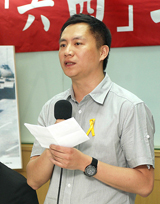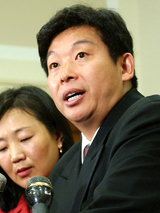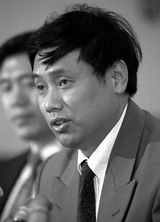World
condemns latest North Korean nuclear test
SHOWING OFF: Pyongyang said
the test was designed to ‘bolster its nuclear deterrent,’ but the UN, the US,
Russia, Japan, China and many other countries protested the move
REUTERS AND AFP, SEOUL, BEIJING, MOSCOW AND VIENNA
Tuesday, May 26, 2009, Page 1
| International sanctions
in place against North Korea
|
| • UN Security
Council Resolution 1718 of October 2006 imposes arms and financial
sanctions. It also bans sale of luxury goods to the North. • US Treasury Department regulations ban transactions by US firms with some North Korean entities and transactions involving North Korean vessels. Imports of goods made in the North also require prior approval. • Japan bans some imports of North Korean goods and also prohibits port calls by North Korean vessels. SOURCE: THE UN AND US STATE AND TREASURY DEPARTMENTS |
North Korea conducted a second and far more powerful nuclear test yesterday,
triggering an emergency UN Security Council meeting on the blast.
US President Barack Obama said it was “a matter of grave concern to all nations”
and warranted action by the international community.
China said it was “resolutely opposed to” the test, echoing concern expressed by
other permanent members of the Security Council which was due to hold an
emergency meeting yesterday.
The Chinese foreign ministry also demanded that the North keep its promise of
denuclearization and cease all actions that could further worsen the situation.
British Prime Minister Gordon Brown called North Korea “a danger to the world.”
The Russian defense ministry said the blast was up to 20 kilotons or about equal
in power to the US atom bomb dropped on Nagasaki in 1945 at the end of World War
II.
“The latest steps by North Korea escalate tensions in Northeast Asia and
endanger security and stability in the region,” Russia’s foreign ministry said
in a statement.
EU foreign policy chief Javier Solana called the test “irresponsible” but, like
Obama, did not specify what actions the international community might take.
Yesterday’s blast was up to 20 times more powerful than the North’s first
nuclear test in October 2006, underscoring the advances in its nuclear program
despite multilateral talks on ending Pyongyang’s nuclear weapons ambitions.
The test came amid speculation that North Korean leader Kim Jong-il, his health
uncertain after reports of a stroke last year, wants to strengthen an already
iron grip on power so he can better secure the succession for one of his three
sons.
The official KCNA news agency said the North had “successfully conducted one
more underground nuclear test on May 25 as part of the measures to bolster up
its nuclear deterrent for self-defense in every way.”
A South Korean presidential aide said North Korea had given the US notice of the
latest test, which followed a partially successful long-range rocket launch last
month.
“North Korea’s actions are more for international audience, especially the
United States,” said Koh Yu-hwan, Dongguk University professor of North Korea
studies.
“Hawkish military elements of the North Korean leadership want a stronger
nuclear deterrence and status as a nuclear power before going to the negotiating
table with the US,” Koh said.
North Korea had for weeks threatened to conduct the test in response to tighter
international sanctions following its launch last month of a rocket, widely seen
as a disguised long-range missile that violated UN resolutions.
Following the tightened sanctions, Pyongyang also said it would no longer be a
party to six-country talks on giving up its nuclear weapons program.
Ratcheting up tensions further yesterday, North Korea test-fired three
short-range missiles just hours after the nuclear test, the Yonhap news agency
reported.
Meanwhile, the preparatory committee for the Comprehensive Nuclear Test Ban
Treaty Organization (CTBTO) said yesterday’s “event” measured 4.5 on the Richter
scale and was within a couple of kilometers of the October 2006 test site.
But it said it could not yet determine whether the event had “a nuclear
background,” CTBTO executive secretary Tibor Toth said in Vienna.
Activist
regrets not being able to meet Ma
By Rich Chang and Ko
Shu-ling
STAFF REPORTERS
Tuesday, May 26, 2009, Page 3
Exiled Chinese democracy activist Wang Dan (王丹) said in Taipei yesterday he
regretted that a “planned” meeting with President Ma Ying-jeou (馬英九) in Taipei
before the 20th anniversary of the Tiananmen Square Massacre had not
materialized.
“A confident government would not avoid the issue of the Tiananmen Square
[Massacre], and I believe long-term peaceful cross-strait relations can only
take place after China is democratized,” Wang told a press conference at
Democratic Progressive Party (DPP) headquarters yesterday afternoon after
visiting DPP Chairperson Tsai Ing-wen (蔡英文).
“I welcome the DPP’s publishing of a resolution requesting that the Chinese
Communist Party [CCP] apologize and compensate victims of the massacre,” he
added.
“I have visited Taiwan many times over the years, and found that the Chinese
Nationalist Party [KMT] has more misgivings than the DPP about talking with me,”
Wang said, adding that while the former DPP government often voiced support for
human rights in China, the KMT has been silent since becoming the governing
party.
Wang was one of the student leaders behind a number of protests that resulted in
the CCP’s bloody crackdown on Tiananmen Square in 1989.
Tsai yesterday called on the president to publicly acknowledge and condemn the
CCP for the Tiananmen Square crackdown.
Tsai said that Ma had been doing exactly that for years, but promptly stopped
when Ma became president last year.
She added that while China has oppressed democracy movements domestically and
overseas, Taiwan also faced a democratic crisis since the KMT came to power.
She said that, after meeting Wang yesterday, she decided the DPP would seek more
contacts with Chinese civil society and Chinese democracy activists to promote
universal values.
Meanwhile, the Presidential Office yesterday dismissed allegations that Ma had
canceled a meeting with Wang and said Ma has been consistent in his stance on
the Tiananmen Square Massacre.
Presidential Office Spokesman Wang Yu-chi (王郁琦) said officials had been unable
to finalize the details for setting up a meeting between Ma and Wang Dan,
although they did try to find a suitable time for them to meet.
“We are not going back on any promise,” the spokesman said. “We tried, but we
did not make any promises.”
Wang Yu-chi made the remarks in response to a question about a report in
yesterday’s Chinese-language Liberty Times (the Taipei Times’ sister paper).
The report quoted Wang Dan as saying the Presidential Office notified him before
he visited Taiwan that a meeting had been scheduled for last Wednesday or
Thursday. However, the meeting was later canceled, Wang Dan said, adding that he
did not know why and regretted the development.
Wang Yu-chi said Ma’s schedule was usually booked one month in advance, but Wang
Dan had inquired last week about the possibility of meeting the president.
Ma was particularly busy before and after the first anniversary of his
inauguration and some of the arrangements were canceled, Wang Yu-chi said.
The spokesman reiterated that Ma was consistent in his attitude toward the 1989
massacre and would issue a statement to the press corps on the plane when he
returns from a 10-day visit to Central America next Thursday.
Ma will embark on the trip to Central America today.
Wang Dan told the Liberty Times on Sunday that Ma used to care about the
Tiananmen Square democracy activists. They had met every year when Ma was Taipei
mayor, he said, but he has not had a chance to meet Ma since he was elected
president in March last year.
In related news, Wang Yu-chi said that while it was regretful that former South
Korean president Roh had plunged to his death, he acknowledged Roh’s choice to
protect his dignity, but not the method he used.
Chen says
he wants to live to see his enemies punished
By Shelley Huang
STAFF REPORTER
Tuesday, May 26, 2009, Page 3
Former president Chen Shui-bian (陳水扁) said yesterday he would not commit suicide
like former South Korean president Roh Moo-hyun because he wanted to live to see
his enemies punished.
Kaohsiung City Councilor Huang Chao-hsing (黃昭星) yesterday visited Chen at the
Taipei Detention Center. After the visit, Huang told reporters that Chen said he
would not follow the path of the former South Korean president.
The news of Roh’s death on Saturday has been met with concern in Taiwan that
Chen might also contemplate suicide. Roh and Chen are similar in many ways. They
are both former presidents who built their reputation as clean politicians
fighting government corruption, only to have their reputations tainted by graft
charges.
Huang said Chen’s wife, Wu Shu-jen (吳淑珍), who has had health problems since she
was run over by a truck in 1985 — leaving her paralyzed — had told the former
president that she would live to see him come out from behind bars.
Huang said Chen told him he would maintain a relaxed attitude and come out of
jail alive, and that he would not fall into the trap set by people who wanted to
see him dead, Huang added.
Chen has been held at the Taipei Detention Center since Dec. 30 on charges
including money laundering, embezzlement and corruption.
He was indicted on Dec. 12 and charged with illegally receiving or embezzling
NT$490 million (US$15 million). He has repeatedly denied the charges and has
denounced his trial as political persecution.
Hong Kong
denies entry to Tiananmen dissidents
AP, HONG KONG
Tuesday, May 26, 2009, Page 5
   |
| From left to
right, Chinese democracy activists Wang Dan, Yang Jianli and Wang Juntao
are pictured in this combo photo. PHOTO: AP |
Three US-based dissidents involved in 1989 pro-democracy protests in
Tiananmen Square have been denied visas to attend a Hong Kong conference about
China’s military crackdown on the demonstrations, an organizer said yesterday.
The Tiananmen crackdown, which killed at least hundreds of people, remains a
taboo in China, where the government still considers the student protests a
“counterrevolutionary” riot. Beijing has never given a full accounting of the
military action.
Wang Dan (王丹) and Wang Juntao (王軍濤) were denied visas when they applied at
Chinese consular offices, Hong Kong political scientist Joseph Cheng (鄭宇碩) said
in a phone interview. A third, Yang Jianli (楊建利), was denied entry when he
arrived at Hong Kong airport three weeks ago, Cheng said.
A fourth dissident, Beijing-based Chen Ziming (陳子明), also said he was unable to
attend the conference but it wasn’t clear why, Cheng said.
Wang Dan, one of the student leaders of the 1989 protests, was jailed after the
crackdown and went into exile in the US in 1998. He is now teaching in Taiwan.
Wang Juntao and Chen were founders of a private think tank on social issues and
advised students during the protests.
Both intellectuals were sentenced to 13 years in jail and freed on medical
parole in 1993. Chen was rearrested in 1995 and released in 1996.
Yang, a US permanent resident, also took part in the protests and later served a
five-year jail term in China on charges of spying for Taiwan and entering China
illegally.
Wang Dan and Yang had previously been denied permission to visit Hong Kong,
although Chen was allowed to visit in April 2007 for research.
Wang Dan said last year Chinese officials have refused to renew his Chinese
passport, which expired in 2003, and has been traveling on travel documents
issued by the US government.
Cheng said he had invited the four dissidents to attend a panel discussion on
the Tiananmen protests as part of an academic conference scheduled to be held at
the City University of Hong Kong next Tuesday and Wednesday, just ahead of the
20th anniversary of the military crackdown on Thursday.
The Chinese foreign ministry didn’t immediately return a reporter’s call seeking
comment on the visa denials. Calls and e-mails to the dissidents weren’t
immediately answered.
Hong Kong’s Immigration Department said in statement it won’t comment on Yang’s
case.